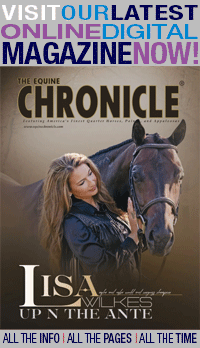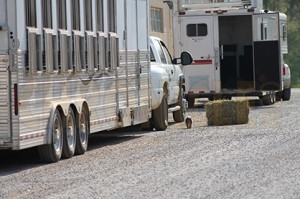Reduce Your Horse’s Risk of Infection During Travel Season
By: Dr. Juliet Getty, P.h.D.
For many horses, this is the season for traveling to fall horse shows and events. Considering periodic outbreaks of equine herpes virus (EHV-1) and other infectious diseases, it is critical that your horse be in top physical health before embarking to an unfamiliar area. The foundation of that health is a strong immune system. Added antioxidants and supportive nutrients can have a positive impact on your horse’s ability to resist an infection.
Boost supplementation of the following nutrients per day for at least two weeks before you leave and throughout the travels or event; wean your horse off of them for two weeks following your return:
- Vitamins E and C: 5 IUs of vitamin E and 5 mg of vitamin C per pound (0.45 kg) of body weight
- Selenium: 3 to 5 mg of selenium
- Vitamin A: 30 to 60 IUs per pound (.45 kg) of body weight
- Omega 3 fatty acids: 1/2 cup chia seeds or ground flaxseeds per 400 lbs (180 kg) of body weight
- Protein: 14-16% of the diet, and of high quality protein by feeding a variety of protein sources
- Magnesium: 5,000 mg of magnesium per 500 lbs (227 kg) of body weight
- B vitamins: Provide a potent B complex preparation.
Be sure to check how much of these nutrients your horse may already be getting from commercial feeds and supplements, and calculate to add only enough to boost quantities as noted above.
Remember that stress suppresses immune function. An empty stomach is incredibly stressful — both mentally uncomfortable and physically painful. Protect your horse by allowing him to graze on hay (and pasture, if available) at all times, throughout the day and night. And never let him perform without some forage in his digestive tract.
Attention to increased nutritional needs will go a long way toward keeping your horse healthy during the time away from his familiar surroundings and routine.
Juliet M. Getty, Ph.D. is an internationally respected, independent equine nutritionist who believes that optimizing horse health comes from understanding how the horse’s physiology and instincts determine the correct feeding and nutrition practices. She is available for private consultations and speaking engagements.
Dr. Getty’s comprehensive resource book, Feed Your Horse Like a Horse, is available at Dr. Getty’s website, www.gettyequinenutrition.com, as well as from Amazon (www.Amazon.com) and other online book retailers. The seven separate volumes in Dr. Getty’s topic-centered “Spotlight on Equine Nutrition” series are also available at her website, where Dr. Getty offers special package pricing, and from Amazon (in print and Kindle versions) and from other online retailers.
Dr. Getty’s website, www.gettyequinenutrition.com, offers a generous stock of useful information for the horseperson. Sign up for her free monthly newsletter, Forage for Thought; browse her library of reference articles; search her nutrition forum; and purchase recordings of her educational teleseminars. Plus, for the growing community of horse owners and managers who allow their horses free choice forage feeding, Dr. Getty has set up a special forum as a place for support, celebrations, congratulations, and idea sharing. Share your experiences at jmgetty.blogspot.com. Reach Dr. Getty directly at gettyequinenutrition@gmail.com.











